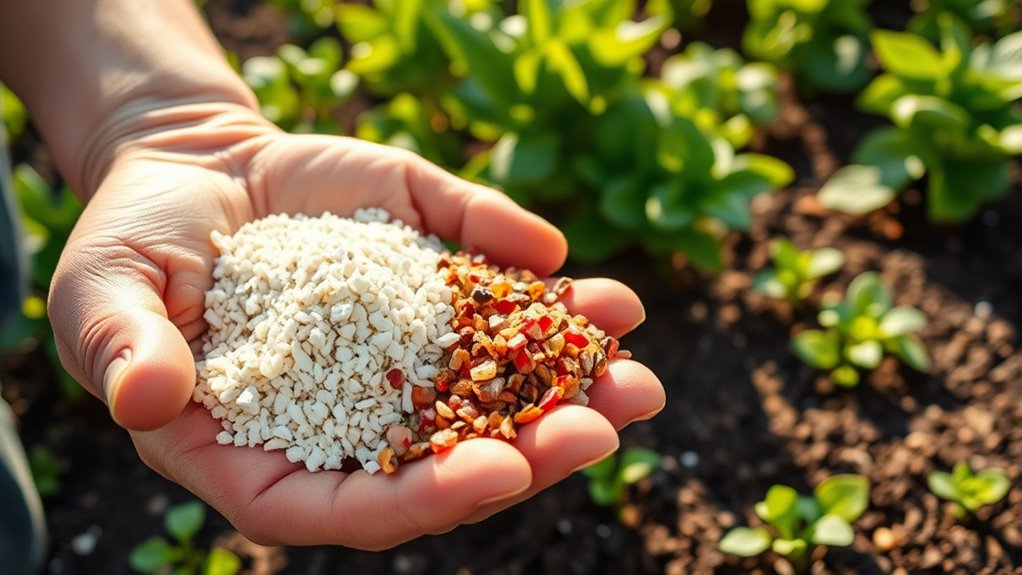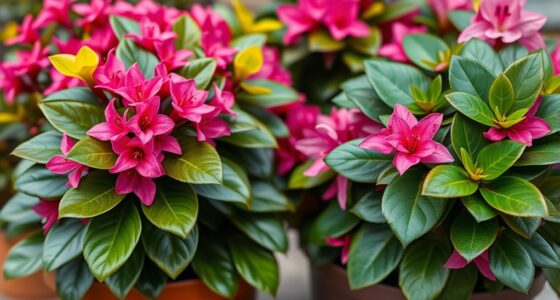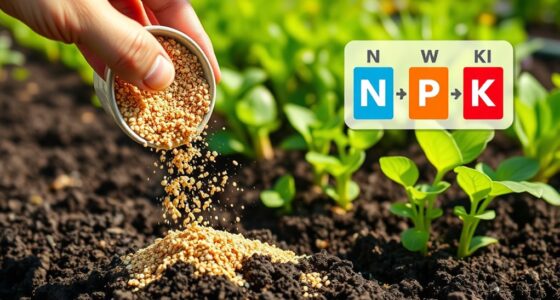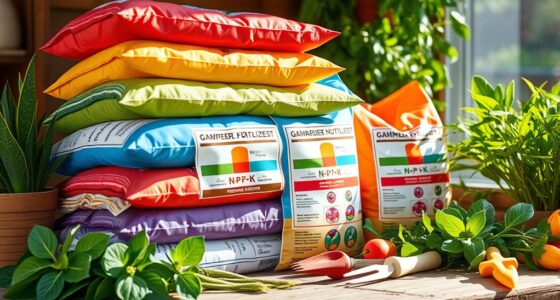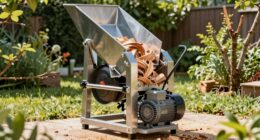Fertilizer 101: N-P-K stands for Nitrogen, Phosphorus, and Potassium, the three primary nutrients plants need. Each plays an essential role: nitrogen promotes leafy growth, phosphorus encourages roots and flowers, and potassium helps overall health. To meet your plants’ needs, choose a fertilizer with the right N-P-K ratio based on their growth stage and soil condition. Keep exploring to learn how to balance these nutrients for beautiful, healthy plants.
Key Takeaways
- N-P-K stands for Nitrogen, Phosphorus, and Potassium, the primary nutrients in most fertilizers.
- Nitrogen promotes leafy growth, phosphorus supports root and flower development, potassium enhances overall plant health.
- Understanding your plants’ specific needs helps in choosing the right fertilizer ratio for optimal growth.
- Soil testing can determine nutrient deficiencies, guiding the appropriate N-P-K application.
- Balanced fertilization prevents deficiencies and excesses, ensuring healthy, productive plants.

Ever wondered what makes plants grow strong and healthy? The answer lies not just in watering or sunlight but also in the nutrients they receive from the soil. To optimize plant growth, understanding soil amendments and the difference between organic and synthetic options is essential. Soil amendments are materials added to soil to improve its structure, fertility, and overall health. They help create a better environment for roots to develop and nutrients to become more available to plants. When selecting amendments, you’ll find choices spanning from organic options like compost, manure, and peat moss to synthetic products such as processed fertilizers and chemical conditioners. Organic amendments are derived from natural sources and often improve soil over time, adding organic matter that boosts microbial activity and enhances nutrient retention. Synthetic amendments, on the other hand, are manufactured chemicals designed for quick results, providing specific nutrients in readily available forms. Your choice depends on your gardening goals, the soil’s current condition, and whether you prefer environmentally friendly solutions or faster-acting formulations. Both types have their place, but understanding their differences helps you make informed decisions to meet your plants’ needs.
Additionally, understanding the importance of nutrient balance and how to adjust fertilization accordingly ensures optimal plant health and growth.
Frequently Asked Questions
How Often Should I Fertilize Organic Versus Synthetic Plants?
You should fertilize organic plants every few weeks with organic amendments to support soil health, while synthetic plants typically need more frequent feeding, often weekly or biweekly. Organic fertilizers release nutrients slowly, promoting long-term soil robustness. Synthetic options provide quick nutrients but can harm soil health if overused. Adjust your schedule based on plant type, growth stage, and soil conditions to keep your plants healthy and thriving.
Can Over-Fertilizing Cause Long-Term Soil Damage?
Think of your soil as a delicate balance beam. Over-fertilizing can tip it, causing long-term soil damage by overwhelming your soil’s natural ability to stay healthy. Excess nutrients can lead to nutrient runoff, polluting nearby water sources and harming ecosystems. This imbalance weakens soil health, making it harder for plants to thrive. So, always follow recommended fertilization rates to keep your soil vibrant and sustainable for years to come.
What Are Signs of Nutrient Deficiencies in Plants?
You might notice deficiency symptoms like yellowing leaves, stunted growth, or pale coloration, which are clear nutrient indicators. If your plants show slow development or unusual leaf spots, it’s a sign they lack essential nutrients. Keep an eye out for these signs, as they help you identify specific deficiencies early. Addressing these nutrient indicators promptly guarantees your plants stay healthy and vibrant, avoiding long-term damage caused by ongoing deficiencies.
Is It Better to Fertilize During the Day or at Night?
You should fertilize during the day because timing considerations matter. Applying fertilizer in daylight allows plants to absorb nutrients efficiently and reduces the risk of runoff, which impacts the environment negatively. Nighttime fertilizing can lead to nutrient leaching and waste. By fertilizing during the day, you support healthier growth while minimizing environmental impact. Always consider weather conditions and soil needs for ideal results.
How Do I Choose the Right Fertilizer for My Specific Plant Type?
Think of selecting fertilizer as choosing the right key for a lock; it needs to fit perfectly. To do this, start with soil testing to uncover your plant’s hidden needs. Use plant-specific formulas that cater to its unique demands, whether it’s a leafy green or flowering beauty. This targeted approach guarantees your plant gets exactly what it requires to thrive, transforming your garden into a lush, vibrant masterpiece.
Conclusion
Now that you know about N-P-K and what your plants need, you’re ready to give them the perfect boost. Think of fertilizer as a recipe — each nutrient is an ingredient that helps your garden thrive. With a little attention and care, your plants will flourish like a lush, green paradise. Remember, just like a good chef, understanding your ingredients makes all the difference in creating a beautiful, healthy garden you’ll love to watch grow.
